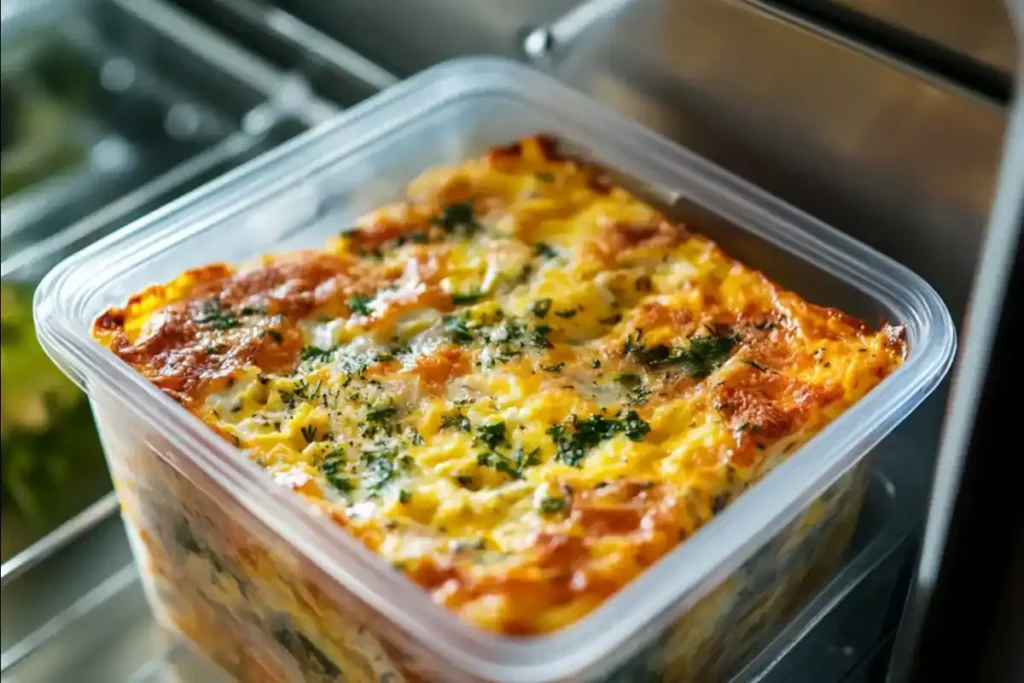A detailed guide to help you store, reheat, and enjoy your egg casserole without worry.
Egg casseroles have long been a staple in many U.S. kitchens. They’re versatile, comforting, and budget-friendly. However, people often wonder how long is a baked egg casserole good for? Proper storage is key, especially if you want to reduce waste and prevent foodborne illnesses. This detailed article explores everything from cooking temperatures to container choices. We’ll also discuss common mistakes and practical tips to extend freshness. By the end, you’ll know how to keep your favorite casserole safe, tasty, and ready for that next meal.
Check the USDA guidelines for detailed information on storing egg-based dishes. Additionally, you may find FDA’s leftover tips helpful when labeling containers in your fridge. Afterward, you might also reference CDC resources for specific advice on preventing cross-contamination in the kitchen. These combined references will help you handle eggs, dairy, and cooked meats responsibly. Indeed, a well-informed approach helps ensure your baked egg casserole remains safe and delicious for several days.
Albeit we’d like to think that egg dishes stay good indefinitely, that’s not realistic. Undoubtedly, the protein-rich nature of this meal can accelerate bacterial growth. Consequently, you need to be thorough when storing or reheating. Because a spoiled casserole may lead to foodborne illnesses, it’s crucial to follow recommended safety tips. In the upcoming section, we’ll explore why egg casseroles need extra care, focusing on their composition and high moisture content.
Why Egg Casseroles Need Special Attention
Egg casseroles blend eggs, cheese, and often meat. Therefore, they have layers of moisture that invite bacterial growth if handled improperly. Concurrently, many recipes also include vegetables that can add water to the dish. Over time, this extra moisture can make the casserole degrade faster. In addition, certain cheeses or creams can sour if they sit too long at improper temperatures.
Besides, the thickness of an egg casserole complicates things. Sometimes, the center might cool more slowly than the edges. Henceforth, bacteria could flourish if the dish remains in the danger zone between 40°F and 140°F for too long. Though an egg casserole may appear fully cooked, it’s prudent to check with a thermometer. Likewise, layering multiple ingredients can cause uneven cooking. Indeed, these intricacies make safe handling vital.
Another mistake is leaving the casserole out on the counter. People often assume that a quick ambient cooldown is harmless. However, letting it sit out for extended periods fosters bacterial multiplication. In the subsequent chapter, we’ll see precisely which factors influence how quickly an egg casserole might spoil.
Factors Influencing Baked Egg Casserole Freshness
Ingredients Used
Firstly, a casserole loaded with bacon, sausage, or ham has extra protein. That protein requires more diligent oversight. Also, certain cheeses—like soft, creamy varieties—spoil faster than harder types. Additionally, produce with high water content (e.g., diced tomatoes or spinach) can leak moisture into the casserole base, potentially affecting its shelf life.
Ambient Kitchen Temperature
The environment matters too. A warmer kitchen accelerates bacteria’s growth, so the faster you chill your casserole, the better. Comparatively, cooler conditions might slow spoilage, but it’s still best to adhere to recommended guidelines. Basically, you don’t want your food sitting out for more than two hours.
Method of Cooking and Packaging
Thoroughly cooked casseroles are less risky because high heat kills bacteria initially. Nonetheless, once your casserole cools, new bacteria can appear if it’s not sealed properly. Correspondingly, how you wrap or contain it is also a factor. A casserole covered in plastic wrap might not last as long as one sealed in an airtight container. Accordingly, it’s wise to consider both cooking and storing methods.
These are just the basics. In the next installment, we’ll explain how to prepare your egg casserole to minimize risks from the start.
Proper Preparation Techniques
Safe Handling of Raw Eggs
Eggs can carry Salmonella or other bacteria if not handled correctly. Always choose fresh eggs and keep them refrigerated until cooking. Certainly, wash your hands before and after handling them. Emphatically, do not crack eggs on the rim of your mixing bowl if you can avoid it, because it may spread bacteria. Instead, crack them on a flat surface. Likewise, discard any eggs that appear cracked or dirty.
Cooking Temperature Guidelines
Ensuring that your casserole reaches an internal temperature of at least 160°F (about 71°C) is key. If you’re adding meat, it should be fully cooked beforehand or brought up to 160°F in the casserole. Hence, use a reliable digital food thermometer. Comparatively, trusting your eyes alone can be deceptive. Subsequently, confirm multiple spots, especially the casserole’s center.
Tips to Ensure Even Baking
Occasionally, a casserole might brown on top yet remain undercooked inside. Thus, stirring your batter lightly before baking can help distribute ingredients. Additionally, rotating the dish in the oven halfway can encourage even heat distribution. Moreover, if the top browns too quickly, cover it loosely with foil to avoid burning. In the following segment, we’ll transition to how best to cool and store your dish after it’s done baking.
Cooling and Storage Essentials

Allowing Brief Cooling Before Refrigeration
When your casserole exits the oven, let it stand for about 15 minutes. During this time, excess steam escapes, preventing condensation in your container. However, do not leave it out for extended periods. Remember, the more time it stays at room temperature, the greater the risk of bacterial growth.
Airtight Containers and Portioning
Splitting your casserole into smaller containers is advantageous. Principally, it cools faster. Equally, you can later reheat individual servings rather than the entire batch. Accordingly, ensure each container is airtight to avoid exposure to other odors in the fridge. Before sealing them, label each container with the date.
Labeling and Date Tracking
Dates matter. Eventually, you might lose track of how long something has been in the fridge. Writing “egg casserole” along with the date helps you track freshness. Chiefly, a simple sticky note or permanent marker on the lid works well. Albeit this might seem like a small detail, it can be the difference between a safe meal and a questionable leftover. In the upcoming section, we’ll explore how long your baked egg casserole remains good in the fridge.
Recommended Time Frames in the Fridge
We arrive at the central question: how long is a baked egg casserole good for? Typically, three to four days is a safe bet. However, the exact timing can fluctuate. Likewise, some casseroles might maintain flavor and texture a bit longer, but safety guidelines remain conservative to reduce any risk of foodborne illness.
Still, you should watch for any changes in smell, color, or texture. If you sense a sour smell or observe an unusual layer of moisture on top, discard it. Surely, it’s wiser to toss questionable food than risk health issues. In the next phase, let’s delve into reheating tips that preserve taste while ensuring your leftover casserole is safe to eat.
Reheating Guidelines
Oven vs. Microwave Methods
The oven method maintains the best texture. Accordingly, set your oven to about 325°F (160°C). Place the casserole in a baking dish, cover it with foil, and heat until the internal temperature reaches at least 165°F (74°C). Conversely, using a microwave is faster but may create uneven hot spots. Therefore, stir or rearrange the pieces midway to ensure even heating.
Best Practices for Texture and Safety
Covering your casserole while reheating locks in moisture. Also, if you see dryness, sprinkle a small amount of milk, cheese, or even a dash of broth on top. That infusion helps restore a soft consistency. Simultaneously, confirm every part is hot, especially the center. Because leftover casseroles can sometimes hide cold pockets, a food thermometer is invaluable.
Avoiding Repeated Reheating
Reheating the same portion multiple times is problematic. Specifically, each warm-up period invites more bacterial risks. Hence, keep leftover portions small so you can heat only what you plan to consume. In the upcoming section, we’ll examine how freezing can drastically extend your casserole’s lifespan.
Freezing Egg Casserole for Extended Shelf Life

Freezer-Safe Packaging
Freezing is a wise choice if you’ve made a large batch. Albeit some folks skip proper packaging, it’s crucial. Surely, freezer-safe containers or heavy-duty freezer bags are best. Remove extra air to avoid freezer burn. Additionally, label each package with the date so you know exactly when you stored it.
Thawing Strategies
It’s safer to thaw casseroles in the fridge overnight. Nevertheless, if you’re short on time, you can go straight from freezer to oven, but expect longer bake times. Ultimately, avoid leaving it on the counter. That’s because the center may remain frozen while the edges enter the danger zone. Correspondingly, place the dish in a preheated oven and test the temperature frequently.
Timeline for Frozen Storage
Egg casseroles often retain quality for up to two or three months in the freezer. Evidently, beyond that, they may still be edible but can suffer flavor and texture loss. Eventually, if you leave them much longer, you might find the taste unappealing. In the ensuing segment, we’ll discuss common problems people face with leftover egg casserole and how to address them.
Troubleshooting Common Problems
Even the most careful home cooks can encounter challenges. Here are a few that crop up regularly:
- Watery Texture
- Often stems from vegetables with high water content.
- Sauté watery veggies first to reduce liquids.
- Alternatively, blot them with a paper towel before adding to the casserole.
- Off Smell or Visible Mold
- This sign is a clear red flag.
- Bacteria or fungi may have multiplied.
- Discard the dish immediately.
- Dry or Rubbery Consistency
- Reheating at too high a temperature or for too long can cause dryness.
- Add a splash of milk or a layer of cheese to restore moisture.
- Also, cover the dish when reheating to lock in steam.
In the next division, let’s explore how leftover egg casserole can be creatively reused. These ideas help you reduce food waste and keep meals interesting.
Ways to Repurpose Leftover Egg Casserole
- Breakfast Wraps
- Crumble leftover pieces and place them in tortillas.
- Add salsas or diced tomatoes for added freshness.
- Roll them up for quick breakfasts on the go.
- Brunch Casserole 2.0
- Chop leftover casserole into cubes.
- Mix with new vegetables and top with cheese.
- Bake again until heated through.
- Egg Salad Twist
- Mash small pieces of egg casserole.
- Stir in a bit of mayo or Greek yogurt.
- Spread on bread or crackers for a fast snack.
- Mini Frittatas
- Layer crumbled casserole in muffin tins.
- Add extra beaten eggs or cheese.
- Bake at 350°F (175°C) until set for quick single servings.
These suggestions can help you avoid waste. They also keep meals interesting because you don’t have to serve the same dish repeatedly. Advancing to the next topic, let’s see what food safety professionals and culinary experts say regarding recommended storage times.
Expert Insights and Scientific Perspectives
Food scientists emphasize that egg dishes need strict temperature control. Consequently, the FDA’s leftover guidelines highlight keeping foods out of the danger zone. Additionally, they recommend not allowing perishable items to linger on countertops for more than two hours. Because eggs, meat, and dairy offer prime conditions for bacterial growth, egg casseroles receive extra scrutiny.
Many chefs also suggest thorough cooking. Forthwith, they stress using quality ingredients from the start. Because lesser quality items could spoil sooner, they hamper the casserole’s overall shelf life. Furthermore, cultural approaches to egg dishes vary. Some traditions serve them right away, while others allow them to sit at room temperature longer. Nonetheless, modern health authorities generally prioritize caution. Transitioning to the subsequent portion, we’ll summarize crucial points and wrap up our main discussion on storing egg casseroles.
Conclusion
We’ve covered all aspects related to how long is a baked egg casserole good for? The short answer is typically three to four days in the fridge. However, each casserole is unique. Watch how you cook it, how you chill it, and how it’s stored. Certainly, pay close attention to signs of spoilage like strange smells or discoloration. If anything seems off, discard the casserole right away.
Throughout this guide, we explored why egg casseroles need special care, how to prepare them safely, and the differences between oven and microwave reheating. We also covered freezing tips for those times you want to prepare in bulk. Above all, remain consistent in your approach to storing leftovers. Keep them chilled, sealed, and properly labeled. Undoubtedly, a well-cared-for casserole means a safer, more delicious meal for you and your family.
Remember that even if your casserole looks fine, it might still harbor unwanted bacteria if stored past its safe window. Hence, when in doubt, trust your instincts. It’s always better to throw out questionable leftovers than to risk getting sick. In the next subsection, let’s answer a few common questions related to egg casseroles and their shelf life.
Frequently Asked Questions (FAQs)
How long will egg casserole keep in the fridge?
Usually, egg casserole lasts three to four days if stored correctly. Keep it in airtight containers, label it with the date, and reheat thoroughly before eating. If you spot any unusual smells or growth, discard immediately.
How long does a cooked casserole keep in the fridge?
In most cases, cooked casseroles remain safe for three to four days as well. This timeframe applies to many types of casseroles, including those with meat, cheese, or veggies. Always double-check for spoilage signs and ensure it hasn’t been left at room temperature too long.
Can you eat leftover egg casserole?
Yes. As long as you stored it promptly, followed safety guidelines, and reheated it to at least 165°F, it’s safe to consume. Make sure it still looks and smells fresh. If the casserole has been around for more than four days, it’s better to discard it.
How long can a premade casserole stay in the fridge?
A premade casserole (i.e., assembled but not baked yet) can typically stay in the fridge for up to two days before cooking. However, ingredients must be fresh to begin with. If you use older produce or nearing-expiration dairy, that window might be shorter.

